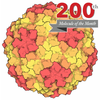[English] 日本語
 Yorodumi
Yorodumi- PDB-7bsi: Epstein-Barr virus, one asymmetric unit structure of the icosahed... -
+ Open data
Open data
- Basic information
Basic information
| Entry | Database: PDB / ID: 7bsi | ||||||||||||||||||
|---|---|---|---|---|---|---|---|---|---|---|---|---|---|---|---|---|---|---|---|
| Title | Epstein-Barr virus, one asymmetric unit structure of the icosahedral tegumented capsid | ||||||||||||||||||
 Components Components |
| ||||||||||||||||||
 Keywords Keywords |  VIRUS / tegumented capsid / icosahedral reconstruction VIRUS / tegumented capsid / icosahedral reconstruction | ||||||||||||||||||
| Function / homology |  Function and homology information Function and homology informationT=16 icosahedral viral capsid /  viral capsid assembly / viral process / viral capsid assembly / viral process /  viral capsid / host cell nucleus / structural molecule activity / viral capsid / host cell nucleus / structural molecule activity /  DNA binding DNA bindingSimilarity search - Function | ||||||||||||||||||
| Biological species |   Epstein-Barr virus (Epstein-Barr virus) Epstein-Barr virus (Epstein-Barr virus) | ||||||||||||||||||
| Method |  ELECTRON MICROSCOPY / ELECTRON MICROSCOPY /  single particle reconstruction / single particle reconstruction /  cryo EM / Resolution: 4.1 Å cryo EM / Resolution: 4.1 Å | ||||||||||||||||||
 Authors Authors | Li, Z. / Yu, X. | ||||||||||||||||||
| Funding support |  China, 5items China, 5items
| ||||||||||||||||||
 Citation Citation |  Journal: Cell Res / Year: 2020 Journal: Cell Res / Year: 2020Title: CryoEM structure of the tegumented capsid of Epstein-Barr virus. Authors: Zhihai Li / Xiao Zhang / Lili Dong / Jingjing Pang / Miao Xu / Qian Zhong / Mu-Sheng Zeng / Xuekui Yu /  Abstract: Epstein-Barr virus (EBV) is the primary cause of infectious mononucleosis and has been shown to be closely associated with various malignancies. Here, we present a complete atomic model of EBV, ...Epstein-Barr virus (EBV) is the primary cause of infectious mononucleosis and has been shown to be closely associated with various malignancies. Here, we present a complete atomic model of EBV, including the icosahedral capsid, the dodecameric portal and the capsid-associated tegument complex (CATC). Our in situ portal from the tegumented capsid adopts a closed conformation with its channel valve holding the terminal viral DNA and with its crown region firmly engaged by three layers of ring-like dsDNA, which, together with the penton flexibility, effectively alleviates the capsid inner pressure placed on the portal cap. In contrast, the CATCs, through binding to the flexible penton vertices in a stoichiometric manner, accurately increase the inner capsid pressure to facilitate the pressure-driven genome delivery. Together, our results provide important insights into the mechanism by which the EBV capsid, portal, packaged genome and the CATCs coordinately achieve a pressure balance to simultaneously benefit both viral genome retention and ejection. | ||||||||||||||||||
| History |
|
- Structure visualization
Structure visualization
| Movie |
 Movie viewer Movie viewer |
|---|---|
| Structure viewer | Molecule:  Molmil Molmil Jmol/JSmol Jmol/JSmol |
- Downloads & links
Downloads & links
- Download
Download
| PDBx/mmCIF format |  7bsi.cif.gz 7bsi.cif.gz | 4.5 MB | Display |  PDBx/mmCIF format PDBx/mmCIF format |
|---|---|---|---|---|
| PDB format |  pdb7bsi.ent.gz pdb7bsi.ent.gz | Display |  PDB format PDB format | |
| PDBx/mmJSON format |  7bsi.json.gz 7bsi.json.gz | Tree view |  PDBx/mmJSON format PDBx/mmJSON format | |
| Others |  Other downloads Other downloads |
-Validation report
| Arichive directory |  https://data.pdbj.org/pub/pdb/validation_reports/bs/7bsi https://data.pdbj.org/pub/pdb/validation_reports/bs/7bsi ftp://data.pdbj.org/pub/pdb/validation_reports/bs/7bsi ftp://data.pdbj.org/pub/pdb/validation_reports/bs/7bsi | HTTPS FTP |
|---|
-Related structure data
| Related structure data |  30162MC  7bqtC 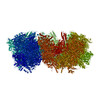 7bqxC  7br7C  7br8C M: map data used to model this data C: citing same article ( |
|---|---|
| Similar structure data |
- Links
Links
- Assembly
Assembly
| Deposited unit | 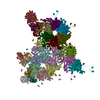
|
|---|---|
| 1 | x 60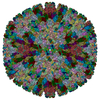
|
| 2 |
|
| 3 | x 5
|
| 4 | x 6
|
| 5 | 
|
| Symmetry | Point symmetry: (Schoenflies symbol : I (icosahedral : I (icosahedral )) )) |
- Components
Components
| #1: Protein | Mass: 18169.100 Da / Num. of mol.: 16 / Source method: isolated from a natural source Source: (natural)   Epstein-Barr virus (strain B95-8) (Epstein-Barr virus (strain B95-8)) Epstein-Barr virus (strain B95-8) (Epstein-Barr virus (strain B95-8))Strain: B95-8 / References: UniProt: P14348 #2: Protein | Mass: 154086.828 Da / Num. of mol.: 16 / Source method: isolated from a natural source Source: (natural)   Epstein-Barr virus (strain B95-8) (Epstein-Barr virus (strain B95-8)) Epstein-Barr virus (strain B95-8) (Epstein-Barr virus (strain B95-8))Strain: B95-8 / References: UniProt: P03226 #3: Protein | Mass: 39231.539 Da / Num. of mol.: 5 / Source method: isolated from a natural source Source: (natural)   Epstein-Barr virus (strain B95-8) (Epstein-Barr virus (strain B95-8)) Epstein-Barr virus (strain B95-8) (Epstein-Barr virus (strain B95-8))Strain: B95-8 / References: UniProt: P03187 #4: Protein | Mass: 33654.039 Da / Num. of mol.: 10 / Source method: isolated from a natural source Source: (natural)   Epstein-Barr virus (strain B95-8) (Epstein-Barr virus (strain B95-8)) Epstein-Barr virus (strain B95-8) (Epstein-Barr virus (strain B95-8))Strain: B95-8 / References: UniProt: P25214 |
|---|
-Experimental details
-Experiment
| Experiment | Method:  ELECTRON MICROSCOPY ELECTRON MICROSCOPY |
|---|---|
| EM experiment | Aggregation state: PARTICLE / 3D reconstruction method:  single particle reconstruction single particle reconstruction |
- Sample preparation
Sample preparation
| Component | Name: Human gammaherpesvirus 4 Epstein–Barr virus / Type: VIRUS / Source: NATURAL Epstein–Barr virus / Type: VIRUS / Source: NATURAL |
|---|---|
| Source (natural) | Organism:   Human gammaherpesvirus 4 (Epstein-Barr virus) Human gammaherpesvirus 4 (Epstein-Barr virus) |
| Details of virus | Empty: NO / Enveloped: YES / Isolate: STRAIN / Type: VIRION |
| Buffer solution | pH: 7.5 |
| Specimen | Embedding applied: NO / Shadowing applied: NO / Staining applied : NO / Vitrification applied : NO / Vitrification applied : YES : YES |
Vitrification | Cryogen name: ETHANE |
- Electron microscopy imaging
Electron microscopy imaging
| Experimental equipment |  Model: Titan Krios / Image courtesy: FEI Company |
|---|---|
| Microscopy | Model: FEI TITAN KRIOS |
| Electron gun | Electron source : :  FIELD EMISSION GUN / Accelerating voltage: 300 kV / Illumination mode: OTHER FIELD EMISSION GUN / Accelerating voltage: 300 kV / Illumination mode: OTHER |
| Electron lens | Mode: OTHER |
| Image recording | Electron dose: 48 e/Å2 / Film or detector model: GATAN K2 QUANTUM (4k x 4k) |
- Processing
Processing
| Software | Name: PHENIX / Version: 1.14_3260: / Classification: refinement | ||||||||||||||||||||||||||||
|---|---|---|---|---|---|---|---|---|---|---|---|---|---|---|---|---|---|---|---|---|---|---|---|---|---|---|---|---|---|
| EM software |
| ||||||||||||||||||||||||||||
CTF correction | Type: PHASE FLIPPING AND AMPLITUDE CORRECTION | ||||||||||||||||||||||||||||
| Symmetry | Point symmetry : I (icosahedral : I (icosahedral ) ) | ||||||||||||||||||||||||||||
3D reconstruction | Resolution: 4.1 Å / Resolution method: FSC 0.143 CUT-OFF / Num. of particles: 32721 / Symmetry type: POINT |
 Movie
Movie Controller
Controller
















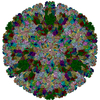
 PDBj
PDBj